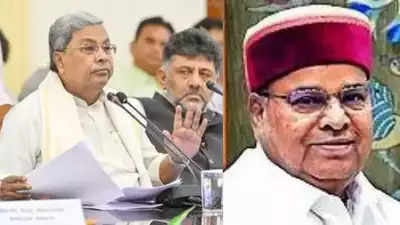- News
- City News
- bengaluru News
- Did Karnataka governor Thaawar Chand Gehlot sanction only inquiry, not prosecution of CM Siddaramaiah?
Trending
Did Karnataka governor Thaawar Chand Gehlot sanction only inquiry, not prosecution of CM Siddaramaiah?
The governor's sanction for the prosecution of CM Siddaramaiah under Section 17A of the Prevention of Corruption Act has triggered a debate. Legal experts argued the sanction permits only investigation. Revenue minister Krishna Byregowda questioned the procedure, while others contended no preliminary investigation is needed. The dual sanction under BNSS-2023 also raises procedural questions.

Karnataka governor Thaawar Chand Gehlot's sanction for the prosecution of CM Siddaramaiah has sparked a contentious debate regarding the powers of the former in such matters.
Some legal experts argued that the sanction granted by Thaawar Chand Gehlot permits only an investigation, and does not authorise prosecution at this stage.

Additionally, the governor granted sanction under Section 218 of Bharatiya Nagarik Suraksha Sanhita (BNSS)-2023, which allows courts to take cognizance of the alleged offences directly based on available material, bypassing the need for an investigation. This dual sanction raises questions about the procedural implications for Siddaramaiah's case.
Revenue minister Krishna Byregowda provided a fresh interpretation of Section 17A, asserting that only police have the authority to seek prosecution sanctions from the governor, and not other entities. He argued that according to the Union govt's order on September 3, 2021, which outlines the standard operating procedures for processing cases under Section 17A, the governor can sanction prosecution only if a preliminary inquiry by police reveals the commission of an offence.
"Who has to tell that the offence has been committed? The investigating officer, right? In this case, who is the investigation officer, the governor's secretary? Here, no preliminary inquiry has been conducted...no police officer has sought permission for sanction. Still, the sanction is given. It clearly shows the misuse of power," the minister claimed.
However, this interpretation has been challenged by legal experts. Senior advocate and former advocate-general
BV Acharya said Section 17A does not mandate a preliminary investigation before sanctioning prosecution. According to Acharya, the section, which was inserted in 2018, requires prior police sanction to investigate charges against public servants. Prior to this, sanction was needed only when cases were taken to court for trial after probe and chargesheets were filed.
Anti-graft activist TJ Abraham, who sought and obtained the governor's permission for prosecuting Siddaramaiah, criticised Byregowda's stance. "The HC, in its circular issued on September 23, 2023, to session courts, stated that prior permission should be a prerequisite for courts to refer the matter for investigation in case of private complaints. So the question of preliminary inquiry doesn't arise at all," he said.
An advocate said public servants had previously resisted allowing police to investigate cases against them without prior permission and supported the insertion of Section 17A to limit police powers. "It is contradictory that the same public servants are arguing for a preliminary probe before granting prosecution sanction."
End of Article
FOLLOW US ON SOCIAL MEDIA










